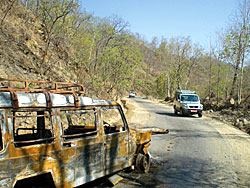 KUNDA DIXIT ALL FIRED UP: One of many dozens of vehicles torched by Tharu activists for defying their highway blockade earlier this month on the Kohalpur-surkhet highway. |
People along the highway call it the "The Second Tharu Banda". It closed down the Tarai for two weeks and paralysed the rest of the country earlier this month. The blockade was called off the day Prime Minister Pushpa Kamal Dahal resigned on 4 May. The first Tharu banda in March had lasted nearly three weeks and brought the country's economy to a standstill.
The efforts to cobble together a new coalition in Kathmandu this week has overshadowed the Tharu agitation, but many fear the highway blockades will restart as soon as a new government is sworn in.There was widespread support across the Tarai for the first Tharu protest in March. Ramkrishna Lekhi's Tharu Kalyankari Sabha and the Tharu Autonomous State Council led by Laxman Tharu had united against what they saw as Madhesi hegemony and even the hill ethnic groups supported the agitation.
But in the second protest, Tharu and Lekhi split and went ahead with a crippling two week shutdown despite opposition from moderate Tharu leaders."All the support that we got from the people during the first agitation we squandered in the second," said one Tharu businessman in Kailali's highway hub of Atariya.
The slogan this time was for "Jal, Jamin, Jungle" signifying the Tharu demand for control over their water, land and forest resources. Local Tharu last week took control of Kailali's scenic Ghoda Ghodi Lake. They burnt down more than 24 VDC buildings in Kailali.
"Their tactics are identical to what the Maoists did," said one Tharu journalist in Dhangadi. That is not surprising since Laxman Tharu was a Maoist battalion commander and broke away when he wasn't made a CA member last year. He was also accused of engineering his own abduction to demand a Rs 1 million ransom from the party. The party also suspected that he failed to hand over all his weapons after the war, and these guns are now reportedly in possession of the self-styled Tharuhat Army.
Maoist distrust of their former Tharu comrades runs deep here in the west. It boiled over after the murder of Maoist journalist J B Joshi by Tharu Maoists last year. Joshi was loyal to Maoist Labour Minister Lekh Raj Bhatt who has rejected the Tharus including the far-west in their Tharuhat territory.
Local journalists say there is intense competition between the Maoists and their Tharu ex-comrades over control of timber or quarry contracts and payoffs from smuggling syndicates. "We can't write about these things, about how they ride around in stolen Scorpios with black shades," one reporter told us, "it's just too dangerous."
As with the Limbuwan agitation in the east, which is also led by ex-Maoists, the most radical faction sets the terms. Even Dilli Chaudhary, the maverick leader of BASE, the Tharu welfare group, and an NC candidate in the last election, has joined Laxman Tharu. Some FM stations in Kailali and Bardiya haven't been able to resist pressure to broadcast provocative programs. In the second agitation, Raj Kumar Lekhi, found many of his cadre joining Laxman Tharu's more hardline group in massing up along the highways.
Sometimes, as in Lahan in the east and Nepalganj in the west, tensions boiled over into ethnic riots between Madhesis and Tharus during the agitation. For many, this is a warning about much worse to come not just here in the Tarai but also with the competing hill ethnic militancies in the coming year as the CA discusses federalism.
The Tharu
The Tharu form the country's third largest ethnic group (after Bahun-Chhetri and Magar) even though they make up just seven per cent of the population. This shows just how diverse Nepal's ethnic mosaic is, with a 'long tail' of nearly 100 smaller groups.
The Tharu are one of Nepal's few aboriginal groups and have population concentrations mainly in the Tarai, Chitwan, Dang, and in the western Tarai, and have been historically exploited with such practices as the Kamaiya tradition, which was outlawed in 2002.
Recent protests were triggered by politicians lumping them together with the Madhesi people in the interim constitution. They reject the One Madhes demand, and want their own Tharuhat territory, although it is not clear how the non-contiguous areas will be woven together.
There are three main Tharu groups: Tharuhat Autonomous State Council lead by ex-Maoist Laxman Tharu, the Tharu Kalyankari Sabha led by Raj Kumar Lekhi, which is sympathetic to the UML and the Maoists' own Tharu State Council.


